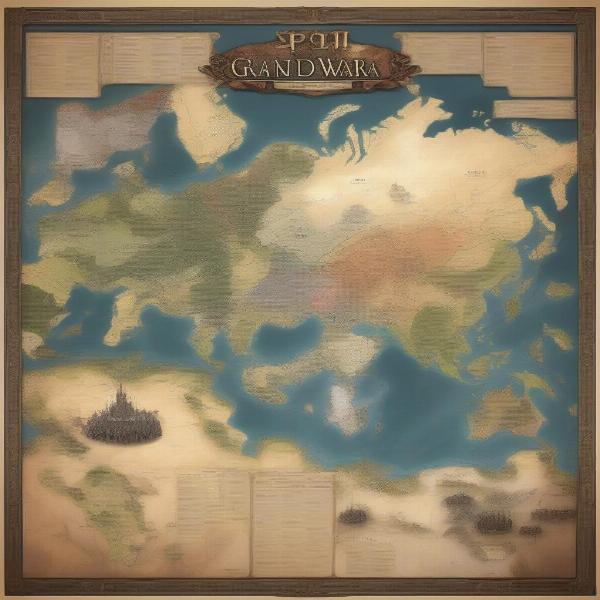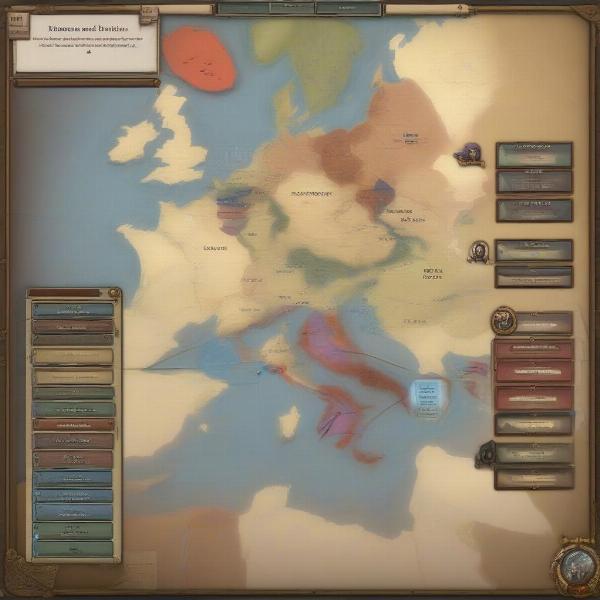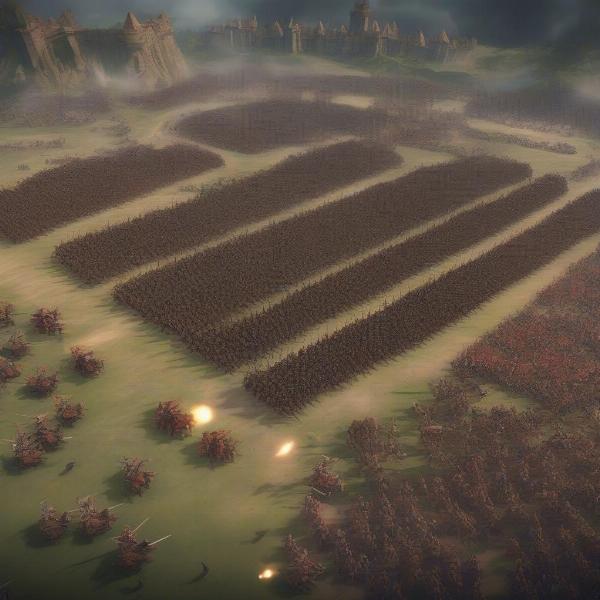The realm of gaming offers diverse experiences, and among the most captivating are Epic War Saga Games. At supremeduelist.blog, we delve into the heart of these grand strategy titles, exploring their intricate mechanics, historical settings, and the strategies that lead to victory. These games often blend turn-based or real-time combat with deep narrative elements, immersing players in conflicts of immense scale. This article will unpack the essence of the epic war saga game genre, highlight key titles, and examine what makes them so addictive and engaging.
This deep dive will first examine what makes a game fit the definition of an epic war saga, and will then proceed to discuss some of the top titles available today. Furthermore, we’ll analyze the crucial gameplay elements and strategies that players must master in order to lead their virtual armies to glory, all while providing some examples of popular series within the space.
What Defines an Epic War Saga Game?
Epic war saga games are characterized by their massive scope, intricate narratives, and strategic depth. Unlike smaller-scale strategy games, these titles often simulate entire conflicts, spanning continents or even planets. They typically involve a blend of military management, economic development, and diplomatic maneuvering. The best examples will be historically inspired or have a rich fictional world built out that allows for total immersion. These are not just skirmishes; they are total wars that demand long-term planning and adaptability.
Key characteristics include large-scale battles, sophisticated technology trees, and the management of resources, allowing you to expand your power base and military might. Many also include diplomacy systems, giving you the chance to make alliances or break treaties with other factions. The narrative aspect is equally important, as many of these games weave compelling stories that draw players into the conflict. Many games in this genre offer some kind of single-player story mode, but the long-term replay value often comes from multiplayer competition, or “sandbox” modes.
 vast-world-map-game
vast-world-map-game
Popular Epic War Saga Game Franchises
Several franchises have become synonymous with the epic war saga genre. Total War, for instance, is renowned for its real-time tactical battles combined with turn-based strategic management. The Civilization series, on the other hand, focuses on the long-term development of a civilization from the Stone Age to the space age, while battling against competing factions. The Hearts of Iron franchise provides a detailed simulation of World War II, requiring players to manage every facet of their nation. There is also a space-based category, with games like Stellaris, that allows players to conquer vast galaxies with varied alien races.
The choice of which games you like best will largely come down to your preferred style of combat, narrative, and level of micromanagement. The strategy in a Total War game can be much different than in a game like Stellaris, and both offer a very different style of play than the historical accuracy focused in the Hearts of Iron series.
For example, the deep strategic thinking required in Star Wars Rebellion board game, a physical game with many similar features to the digital genre, is something that can also provide great practice for these kinds of games.
Key Gameplay Elements
Several elements are consistently present across the genre of epic war saga games. Here’s an examination of the most vital:
Strategic Map Management
Most games in this genre feature a grand strategic map, where you manage your empire’s provinces, cities, and resources. Players will typically be required to build cities, fortifications, and farms, as well as manage the taxation and satisfaction levels of their populations. This includes managing income, researching new technologies, and constructing buildings. In Star Wars Episode 3 Revenge of the Sith video game, players see examples of this as they travel throughout the galaxy, but the focus on that title is more combat-focused than other games within the epic war saga genre.
Military Campaigns and Tactics
Military campaigns are at the core of epic war saga games. Players recruit, train, and equip armies, and then send them to battle on the campaign map or in tactical battles. Victory requires good army composition, effective maneuvers, and the use of terrain to your advantage. These battles are often extremely detailed, with units of different strengths and weaknesses that can affect your outcome. Some games will allow a player to zoom all the way in and control the specific actions of individuals, but many will have players focus on managing larger groups.
Resource Management and Economics
Economic management is vital for funding your war machine and developing your empire. Resources such as food, gold, and raw materials are necessary for constructing buildings, recruiting troops, and researching new technologies. Efficient management of these resources can often be the deciding factor in a long campaign, so players will need to be sure to keep a constant eye on these aspects.
Diplomatic Intrigues
Diplomacy is often just as vital as military might. Forming alliances, negotiating trade agreements, and declaring war are crucial aspects of any epic war saga. Players must carefully weigh the pros and cons of each decision, understanding that every action could have a significant impact on the game. Maintaining good relations is as vital as attacking weak opponents when building your empire.
 diplomatic-interface-game
diplomatic-interface-game
Technology Research
Technological advancements are important for gaining a competitive edge in the game. Players research new technologies, which unlock new units, buildings, and abilities. The technology trees in these games often have many branches, forcing players to choose wisely what to focus on, and how to manage their resources to optimize these advantages. For a more accessible introduction to some of these concepts, you may find our breakdown of the star wars trivia game online a good starting point.
Strategies for Success
Winning an epic war saga game requires more than just sheer military power; it requires strategy, planning, and adaptability. Here are some key strategic principles:
Early Expansion is Key
In the early game, players should focus on expanding their territory to secure resources and strategic locations. This will give them a leg up on their opponents and put them in a better position to succeed later in the game. The ability to take territory early is essential for a strong economy and the ability to raise a large army.
Balance Your Economy and Military
A strong economy is vital for supporting a large army, but players should not focus so much on economics that they are unable to defend their positions. It’s important to maintain a balance between income, military, and diplomatic considerations in any successful campaign.
Adapt to the Environment
The strategic map is not just a backdrop; it’s a living environment that players must learn to use. Utilizing terrain features to their advantage, adapting to seasonal changes, and knowing the strengths and weaknesses of your units is important to your success.
Master Diplomacy
Diplomacy is vital for avoiding costly wars. Players should try to build alliances, trade partners, and friendly relationships to support them. Strategic use of alliances can give an incredible advantage to any player willing to make the investment.
Long-Term Planning
Epic war saga games are marathons, not sprints. Players need to think ahead, planning long-term objectives and strategies. This could include where you choose to place your cities, where you choose to focus on tech, and who you choose as an ally.
According to gaming strategist and historian, Dr. Eleanor Vance, “The best players of epic war saga games think of them as living simulations. It’s about understanding the intricacies of the system and using that knowledge to the advantage of your nation.”
The Allure of Epic War Saga Games
The appeal of the epic war saga game genre comes from the sense of scale and scope. These games allow players to immerse themselves in vast historical or fantastical conflicts, offering a mix of strategy, simulation, and storytelling. The long-term nature of the campaigns allows players to build empires and watch them grow, testing their strategic skills against the game or other players. These games are often a rewarding experience when a player is able to implement their strategies and watch them come to life.
The complexity of these games also leads to a high level of player engagement. Each new campaign is a unique puzzle that needs to be solved, and the high levels of variance means that each game experience is new, and different from all others. The constant decision-making is a major aspect of the game, and the long-term engagement is something that other game genres often struggle to replicate.
 massive-battle-game
massive-battle-game
The ability to control the destiny of a nation, or a planet, is a major aspect of the game, but the depth of these games also makes them very interesting to watch. The complexity of a campaign can be as engaging to viewers as to the players. For those interested in seeing how some of these games played out historically, the best ps2 star wars games offers some of the best historical accuracy available in the video game world.
The Future of Epic War Saga Games
The genre of epic war saga games continues to evolve, with developers constantly experimenting with new features and mechanics. We are seeing more attention to detail, with graphical enhancements and new historical settings, providing new ways to play the game. The advancement of AI will also improve the ability of the computer to compete in new and more challenging ways, meaning that a single player game can continue to be engaging for a long time. Additionally, more multiplayer components are starting to be included with each iteration of these games.
“The future of epic war saga games is bright,” says game development expert, Thomas Andrews. “We’re seeing innovations in AI, graphics, and storytelling that are pushing the genre to new heights.”
These future games may have a renewed focus on diplomacy, or may emphasize the personal stories of individuals caught up in the war. The possibilities of technology will continue to push the boundaries of what is possible, and provide players with more immersive and engaging experiences. With this potential in mind, we look forward to the further innovations of this genre.
Conclusion
Epic war saga games offer a unique blend of strategy, storytelling, and simulation. They provide a level of depth and complexity rarely seen in other genres. As we at supremeduelist.blog continue to explore the diverse world of gaming, we find the epic war saga game to be one of the most engaging and rewarding experiences available, giving us a chance to explore the big picture of conflict throughout history and into the future. Whether you’re a seasoned strategist or a newcomer to the genre, the challenge and reward of these games can provide countless hours of engaging fun. We encourage you to delve into this dynamic genre and take control of history, one strategic move at a time. And if you’re interested in another story-driven game, check out our god of war betrayal game review.
Leave a Reply